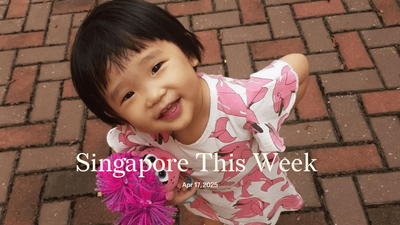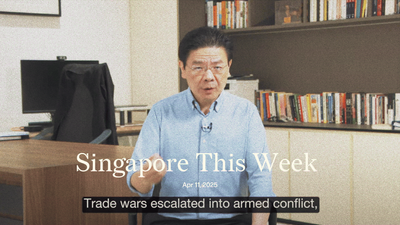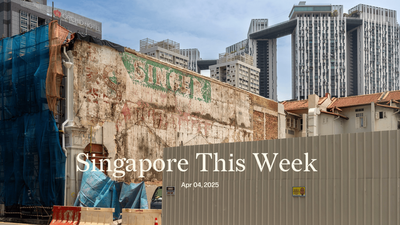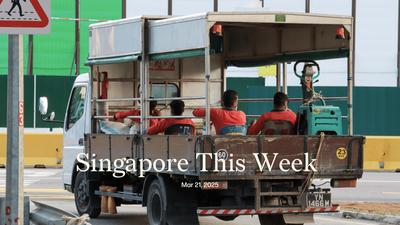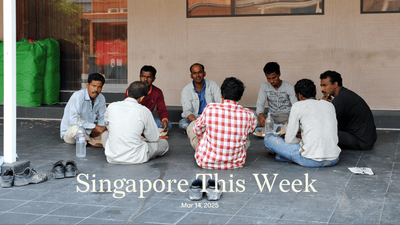Politics: Is it really the end of the Lee family’s reign?
Lawrence Wong, deputy prime minister, will lead the ruling People’s Action Party (PAP) into the next general election (GE), due by November 2025. At the biennial PAP awards, Lee Hsien Loong, the prime minister who’s been in power since 2004, told over 1,000 party members that he intends to hand over leadership to Wong by November 21st 2024, the PAP’s 70th birthday—“if all goes well”, he said, offering himself some wiggle room to continue his reign as one of the world’s longest-serving leaders. For political observers, this answers one question—Wong will indeed have to win his own mandate—and sheds light on another—less chance of an early election. Indeed, the anniversary-obsessed scriptwriters of the PAP’s stagecraft may be rubbing their hands. 2023: LKY100; 2024: PAP70; 2025: SG60—yours to lose, Larry. The handover is good news for all Singaporeans, inside and outside the party, who believe that it’s high time that the powerful Lee family distances itself from the levers of power, and that Wong’s “4G” (fourth-generation) team deserves sufficient space to refresh Singapore’s social compact, as articulated in its Forward Singapore programme. Unfortunately, in so graciously offering himself to “be at the new PM’s disposal”, Lee is likely to linger, rather than retire. Wong may feel the need to offer him a “senior minister” or “minister mentor” role, popularised by Lee Kuan Yew, the latter’s late father. Moreover, in his sometimes fiery speech, Lee trotted out old conservatisms, including that the PAP’s monopoly over Parliament from the late 1960s was “a major reason why Singapore could progress so quickly”; and that the political debate emerging from having more opposition members in Parliament today isn’t always productive. (“Not infrequently, it becomes a political brawl.”) In “The unchanging PAP playbook”, Jom disagreed with these assertions. So even though we now have a potential handover deadline, the nature of the ideological tussle within the PAP—How conservative is Wong? Will he be operating in Lee’s shadow?—will continue to animate observers. Whatever the case, the party will struggle to shake off its perceived elitism and lack of empathy. In Lee’s speech, it came through in the bit where he, to laughter from the crowd, appeared to mock those who own Bearbricks, a collectible toy, while mispronouncing its name: “Brickbears. I never knew what Brickbears was. But now I know. What pleasure does it give people? But some people do. Good luck to them.”
Politics: The ‘Lee and Tharman Amendment’?
The Prime Minister’s Office has tabled constitutional amendments that would enable the president and ministers to accept appointments in foreign and international organisations in their personal capacities, if it is in the national interest for them to do so. The timing is poor, and has inevitably drawn suggestions that it’s being done just to accommodate Tharman Shanmugaratnam, recently elected president, and possibly Lee himself, in the event that he’s offered a cabinet position after he steps down. It’s particularly confusing with Tharman, who already holds several international positions. One of the president’s key roles is to be a check on a profligate government, and so any public concern that the latter may have done favours for the former’s office surely affects the perception of the president’s independence. As to whether senior politicians have the bandwidth to actually perform so many simultaneous roles, that’s a non-issue in Singapore, which is uniquely blessed with an elite class of superhumans. Good luck to them.
Society: Some commuters buay zi dong (no self-awareness/initiative) one
What annoys Singaporeans when commuting on public transport? Those who watch videos with the volume turned all the way up, shove others aside before boarding, yap loudly on the phone, blow vape mist into people’s faces, brazenly pick noses, and manspread, according to The Straits Times (ST). Local psychologists explain such behaviour as a fundamental lack of self-awareness, stemming from the fact that “most people do not spend enough time examining themselves.” A couple of weeks ago, a woman who rested her feet on a bus pole was arrested for public nuisance, following an altercation with the bus driver. (The video went viral on social media.) “Instead of being complainers, we can just tell them nicely about their actions. Singaporeans should stop taking videos and embarrassing people online,” a gentleman in his 40s told ST. Michelle Tay, director of programmes and operations at the Singapore Kindness Movement, echoed this view—shame shouldn’t be our first step. Instead, we should discourage bad behaviour with a smile on our face or a thumbs up to lighten the mood, she suggested. But this might be a big ask for Singaporeans, who cited conflict avoidance as their main reason for not speaking up during encounters with inconsiderate commuters. To combat the specific issue of riders who prop up their (sometimes bare) feet on opposite seats, some have advocated for the removal of facing seats altogether. After all, who enjoys trying to avoid awkward eye contact with a stranger for 45 minutes while riding backwards? Overall, it’s unclear what else can be done. Bus drivers are already trained to handle instances of bad behaviour on commutes (communicate amicably first, if that doesn’t work then report to control centre); and the Land Transport Authority works together with the Public Transport Council, Singapore Kindness Movement as well as public transport operators to run an annual campaign to encourage considerate behaviour on public transport. (Bag down lah, Benny. Say how many times liao?) In some countries like France, Canada and the United States, bad behaviour on public transport can result in a fine. But we have enough of those already.
Earth: Deeper international cooperation needed to end illegal wildlife trade
The world’s wildlife population has been decimated by almost 70 percent in half a century, said Britain’s Prince William, at the United for Wildlife Summit in Singapore. Contributing to the widespread threat of biodiversity loss and species extinction are traffickers in more than 150 countries, who, he said, feed a black market that has made flora and fauna “the fourth most-traded illegal commodity in the world”, worth some US$23bn (S$31.2bn) a year. As the first signatories of the Statement of Principles for a Multilateral Approach to Combating Illegal Wildlife Trade, seven countries—Australia, Canada, New Zealand, Singapore, South Africa, the UK and US—have agreed to strengthen intelligence-sharing and law enforcement cooperation aimed at dismantling this global industry. Joint investigations by cooperating governments would lead to more high-value seizures and arrests, particularly as these criminal networks have become increasingly sophisticated; abusing financial systems across the world to move, hide and launder their ill-gotten gains. Often, these same organised crime syndicates engage in the smuggling of arms and drugs, as well as human trafficking, which makes the illegal trade in wildlife as much “a human crisis as an environmental one”, said Prince William. A 2020 report on wildlife trafficking in South-east Asia by Traffic, a UK-based NGO, condemned “jaw dropping” levels of illegal wildlife trade in the region; estimated to account for 25 percent of the global illegal wildlife trade. But Singapore’s zero-tolerance stance undergirded by stringent laws—hefty fines and jail terms—hasn’t been enough to deter this highly lucrative trade; the city-state remains a major transit hub for illegal wildlife products, like the record 34kg of rhinoceros horns worth S$1.2m found last year. Hitting the criminals’ huge profit margins, with asset seizures, forfeiture and penalties for money laundering, would surely make it less attractive. But it’ll take more than cutting supply to halt the trade. Tackling consumer demand, providing park rangers with better protection and offering poor communities sustainable alternatives (instead of poaching) to earning a living are just as important.
History weekly by Faris Joraimi
According to a Ministry of Home Affairs advisory released last Monday, wearing symbols “related to the Israel-Hamas conflict” can now land you in jail. Displaying flags related to any side of that conflict without a permit will be an offence under the Foreign National Emblems (Control of Display) Act. “Heightened sensitivities” swirling around this “emotive issue” were cited as reasons. Any and all public assemblies related to the ongoing war on Palestine are also banned: the government has already rejected five applications. Friends, Romans, countrymen, we are political! Just the day before, crowds waving little Union Jacks gave Prince William, heir to the British throne, a lusty welcome at Jewel Changi Airport. Some gatherings, some flags, and some “emotive” performances are more acceptable than others. William was here to present the annual Earthshot Prize, which recognises important contributions to environmentalism. I wonder about the carbon footprint from flying the star-studded guest list over. Singapore’s Twitterati quickly noted parallels with an earlier royal visit in 1959, when William’s grandfather the late Philip, Duke of Edinburgh stopped here on a world tour aboard a steam-powered yacht (the “Britannia”), probably not much climate-friendlier than a jet. Arriving on February 22nd, Philip had a festive reception choreographed by the outgoing colonial administration, headed by Governor William Goode and Chief Minister Lim Yew Hock. Schoolchildren lined the streets to greet him, a state banquet was held at Victoria Memorial Hall (now Victoria Theatre), and rallies occupied the Padang. He officially opened Singapore Polytechnic and rode a helicopter to see the infrastructure projects changing the landscape: noting, however, the “lovely countryside” that still surrounded the “tidy” city. But the air was thick with Merdeka, since Singapore was scheduled to attain full internal self-government in May. Philip visited the Constitution Exposition, held to communicate the significance of home rule to the people of Singapore and the functions of their elected government. At a farewell garden party the day before his departure, Philip wished Singaporeans “every success in this new venture”. Absent were invited members of Singapore’s (then) most radical political party, the PAP, which declared a boycott of all functions honouring Philip. Elections that year, mah. The PAP has held power since, and so 1959 effectively marked the point from which the rule of Singapore transitioned from the white men to the men in white. These days, they’re the ones hosting the royals and doing the repression.
Arts: Singaporean poetry that defends the ‘inviolability of life’
The Swedish Institute has awarded Theophilus Kwek, Singaporean writer, translator, editor and researcher, the 2023 Cikadapriset or Cikada Prize. Founded in 2004, the prize is conferred to East Asian poets whose work “defends the inviolability of life.” Kwek is the youngest writer and first Singaporean to win it. He’s published four full-length collections of poetry: They Speak Only Our Mother Tongue (2011), Circle Line (2013), Giving Ground (2016) and Moving House (2020). Anna Gustafson Chen, a Swedish translator and chair of the prize jury, noted that Kwek’s poetry was recognised for being outward-looking and locally rooted, with a “lyrical precision and unfailing social commitment that places it firmly in the centre of history as well as our present age.” The win is more than a validation of Kwek’s literary talent, but also, as he put it, a recognition of the “wealth of writing from Singapore that grapples with questions of belonging and human dignity.” He also hopes that the award will highlight the work of his peers, who seek to “create spaces of welcome and community in Singapore” through their writing.
Arts: Ethos Books Festive Market
Local independent publisher Ethos Books is running a festive market at the Visual Arts Centre from December 1st to 3rd. The market brings together 17 artists, creatives and community organisers. For those keen on some shopping, there’ll be books, prints, stickers, jagua tattoos, soap, and vintage clothing for sale. There’s also food for the soul. This year’s edition of the Ethos Books Festive Market features poetry readings and grounding conversations about belonging and connection, community building through the arts, and the impact of storytelling on fringe communities. Jom will launch its first print issue at the fair: you can get it there, or order it online now and have it shipped to you. We’ll also host a panel discussion on December 1st, titled ‘Picturing the Singapore Dream’ with Sudhir Vadaketh, our editor-in-chief, as well as contributors Nabilah Said from Kontinentalist and Jaya Khidir, a Singapore-based photographer. For more information on the market, and to RSVP for Community Conversations, visit the event page.
Tech: Temus buys another firm and expands into Hong Kong
Temus, a Temasek-backed digital transformation firm, is growing. Last year it made its first acquisition: Dreamcloud, a low-code platform for software development. It has just made its second: Decision Science Agency (DS), a digital services provider. It has also opened an office in Hong Kong, its first outside Singapore. It aims to increase its workforce by five times within the next three years, with strategic acquisitions being one of the ways to achieve its objective. Founded in April 2021, Temus is a joint venture between Temasek and American digital services company UST Global—Temasek invested US$250m (S$339.1m) in UST Global in 2018. The formation of Temus seems to be a key element in UST Global’s strategy to expand its presence in South-east Asia. However, Temus does not just aim to fulfil the expansionary aspirations of its parent companies. It has set its sights on a niche market—public sector agencies—where it faces competition from Singtel-owned NCS. Notably, both these firms have a common link, Temasek, which is in keeping with sibling rivalry between Singapore Inc firms. Singapore’s public sector agencies are respected the world over, and firms that can enable their digital transformation stand to win business regionally.
Tech: MAS slaps DBS with acquisition ban
The Monetary Authority of Singapore (MAS) has slapped a six-month ban on DBS Bank, preventing the bank from initiating new business acquisitions following multiple outages in its digital banking services. The decision was announced in light of persistent disruptions, the latest being on October 14th this year. While under this directive, DBS is also restricted from making non-critical modifications to its IT systems, apart from those related to security. Moreover, DBS is barred from reducing the scope of its brick-and-mortar branches and ATM networks across Singapore, a measure aimed at guaranteeing reliable access to banking services for its customers. These short-term measures are necessary, Ho Hern Shin, the deputy managing director for financial supervision at MAS, emphasised, even as DBS implements longer-term strategies to reinforce its operational resilience. Significantly, DBS has, since 2022, been fined up to US$1.2bn (S$1.6bn) due to repeated digital banking disruptions, indicating the severity of its infrastructural issues. However, MAS expressed satisfaction with DBS’s remediation plan, specifying that senior management would be held accountable. This directive may impact DBS’s potential collaborations with notable partners like Ant Group and JP Morgan. After the six-month period, MAS will reassess DBS’s progress, and based on the review, MAS could either prolong the duration or enforce additional actions. Additionally, MAS has stipulated that DBS will have to apply a 1.8x multiplier to its risk-weighted assets for operational risk, following disruptions in March and May 2023. Will these measures prevent the next blackout on your ATM and credit card? We hope so. In the meantime, it is probably wiser to have cards with multiple banks.
If you enjoy Jom’s work, do get a paid subscription today to support independent journalism in Singapore.


